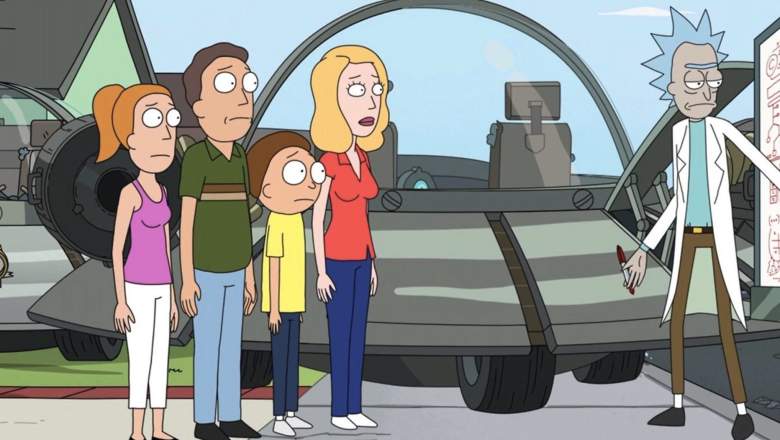
Adult Swim
One of the standout phrases in “Rick and Morty” Season 5 Episode 2 was “Asimov’s Cascade.” But what does it mean? Is it real?
This article will have major spoilers for Season 5 Episode 2 of “Rick and Morty.”
Asimov’s Cascade Refers to the Decoys in the Episode
The term “Asimov’s Cascade” appears to apply specifically to this episode. Heavy conducted a search of Isaac Asimov’s laws and references and couldn’t find anything explicitly referring to the idea of “Asimov’s Cascade.” (We will update this story if any new information is discovered.) Instead, the idea of Asimov’s Cascade appears to be playing off the concept of Asimov’s robot laws, but specifically applied to Rick’s decoys. Perhaps it’s a term that Rick himself made up in-universe. It refers to the decoys realizing they are decoys, resulting in a cascade of decoys killing other decoys.
Rick had created decoy families and planted them throughout the country. If a decoy family was killed, Rick would get a warning and know that he needed to go into hiding to figure out who was after him. But Rick believed the decoys couldn’t create new decoys (or, at least, that’s what a “Rick decoy” said he believed.) As it turns out, the decoys could create decoys. And beyond that, the further away from the original decoy they got, the worse the decoys became. Copies of copies had serious issues, like being made entirely of wood or looking mutated.
In the scene in the YouTube video above from Season 5 Episode 2, Rick explains that they’re looking at a possible “Asimov Cascade.”
He then goes on to explain what that Asimov Cascade is:
When squid started killing decoys, decoys started checking their decoys and learning that they’re making decoys. That’s making them seek out and run into other decoys. Making them realize they’re decoys, making them start to kill other decoys.
We ultimately learned that the decoys were dressed as squids, so it’s not even clear if this all started with a squid killing a decoy, or simply a decoy killing a decoy.
But ultimately, Asimov’s Cascade led to a lot of decoys killing each other. A Beth decoy did try to get them all to live in harmony, but even that did not ultimately work because they could never convince 100% of the decoys to live in peace. In the end, the cascade led to most of the decoys dying.
Asimov’s Laws
Here’s a quick refresher of what Asimov’s Laws are, which were created by Isaac Asimov. Scientific American recounted them in a 2017 article about why they probably wouldn’t ultimately protect humans:
- A robot may not injure a human being or, through inaction, allow a human being to come to harm.
- A robot must obey the orders given it by human beings except where such orders would conflict with the First Law.
- A robot must protect its own existence as long as such protection does not conflict with the First or Second Laws.
In stories where robots took over governmental responsibility, Asimov added a fourth law, referred to as a zeroth law. It reads: “A robot may not harm humanity, or, by inaction, allow humanity to come to harm.”
Asimov’s stories sometimes demonstrate the unintended consequences of these laws and how they don’t necessarily prevent robots from harming humans. Scientific American proposed the idea of empowering robots instead of limiting them, endowing robots with desires to influence the world for the better, while also instructing the robots to improve human empowerment simultaneously. Whether this would work or not is up to debate.
In short, Asimov’s stories illustrated how these protective laws tend to break down, and they’ve been the subject of science fiction stories time and time again. Although it does not appear that Asimov created the Asimov Cascade, its use in “Rick and Morty” was a clear homage to Asimov. Even the best decoy plan that Rick had created still broke down in a cascade of failure, as Asimov too had demonstrated could happen.
READ NEXT: ‘Rick and Morty’ S4E4: What Did Rick See in the Cat’s Mind? [Top Theories]
Comments
‘Rick and Morty’: What Is an Asimov Cascade?